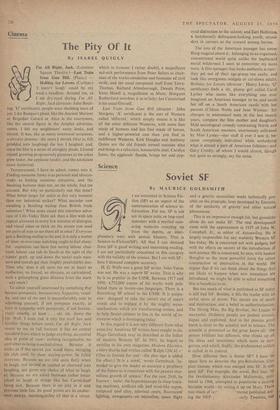Cinema
The Pity Of It
By ISABEL QUIGLY
I'm All Right, Jack. (Leicester Square Theatre.)—Last Train from Gun Hill. (Plaza.) - Holiday for Lovers. (Carlton.) 'I DIDN'T laugh' could be my week's headline. Around me, as I sat dry-eyed during I'm All Right, Jack (director: John Boult- ing; 'U' certificate). people were shedding tears of joy. Like Banquo's ghost, like the Ancient Mariner or Brigadier Gerard or Alice in the courtroom, like the central figure in the Amplex advertise- ments, I felt my neighbours' nasty looks, and shrank. It was, like so many emotional occasions, a circular process : the more I shrank (that is, felt prodded into laughing) the less I laughed; and, since the film is a series of almighty prods, I found myself growing progressively glummer as the jokes grew faster, the applause louder, and the adulation more hysterical.
Temperament, I have to admit, comes into it. Finding someone funny is as personal and idiosyn- cratic as finding someone attractive, and the Boulting humour does not, on the whole, find me amused. But why so particularly not this time? What better target for satire at this very moment than our industrial strikes? What sacreder cow awaiting a Boulting wallop than British trade unionism? What more could this relentless advo- cate of Life-Today films ask than a film with ten topical allusions in every few minutes of dialogue, and visual jokes so thick on the screen you need ten pairs of eyes to see them all at once? Everyone gets a Boulting wallop in the end, it is only a matter of time; so everyone watching ought to feel cheer- ful: capitalists can have fun seeing labour chas- tised, labour can rub its hands at the sight of the bosses' graft, up and down the social scale man- ners and morals get their (highly predictable) due. Then why does it all seem (to me at least) so ineffective, so forced, so obvious, so caricatured, such a galumphing great distance from the mark —any mark?
To admit yourself unamused by something that berates pomposity, bureaucracy, hypocrisy, venal- ity, and sins of the sort is uncomfortably near to admitting yourself, if not pompous exactly, at least in sympathy with pomposity, if not bureau- cratic exactly, at least . . . etc. etc. down the list. Well, I must risk it (my fan mail has said harsher things before now). I'm Ali Right, Jack seems to me to fail because it has no central standard from which to judge anything, no central idea or point of view : nothing recognisable, no anti-what-is-being-knocked-down. Because it looks as if the satirist just stood there, swinging his club until, by sheer staying-power, he felled everyone. Because we are told quite flatly when to laugh, not invited or cajoled or charmed into laughing, not given any choice of what to laugh at. Because we are asked (between rather better jokes) to laugh at things like Ian Carmichael being sick. Because there is no pity in it and precious little fun. Its good points are its exuber- ance, energy, indefatigability (if that is a virtue.
which in humour I rather doubt), a magnificent sad-sick performance from Peter Sellers as chair- man of the works committee and fomenter of civil strife, and the usual competent stuff from Terry- Thomas, Richard Attenborough, Dennis Price; Irene Handl is magnificent as Mum; Margaret Rutherford overdoes it as nflady; Ian Carmichael is his usual film self.
Last Train from Gun Hill (director : John Sturgess; 'A' certificate) is the sort of Western called 'different,' which simply means it is like all the other different Westerns, with more fuss made of humans and less fuss made of horses, and a higher-powered cast than you find in indifferent Westerns. Kirk Douglas and Anthony Quinn are the old friends turned enemies who end things in a reluctant, honourable duel; Carolyn Jones, the eggheads' floozie, brings her odd pop- eyed distinction to the saloon; and Earl Holliman, a handsomely delinquent-looking youth, smoul- ders in corners as the coward among heroes.
The lore of the American teenager has some- thing magical about it : belonging to an organised, concentrated world quite unlike the haphazard social wilderness I seem to remember my teens were. A film teenager that looks authentic is rare : they get out of their age-group too easily, and look like overgrown midgets or cut-down adults. Holiday for Lovers (director : Henry Levin; 'U' certificate) finds a sly, plump girl called Carol Lynley who seems like everything one ever imagined an American teenager to be, and sends her off on a South American razzle with her parents (Clifton Webb and Jane Wyman : for changes in anatomical taste in the last twenty years, compare the film mother and daughter). Mild sociological comedy contrasting North and South American manners, enormously enlivened by Miss Lynley—star stuff if ever 1 saw it, be- cause completely individual while embodying what is almost a part of American folklore—and Gary Crosby, of whom I would almost, though not quite so strongly, say the same.


































 Previous page
Previous page